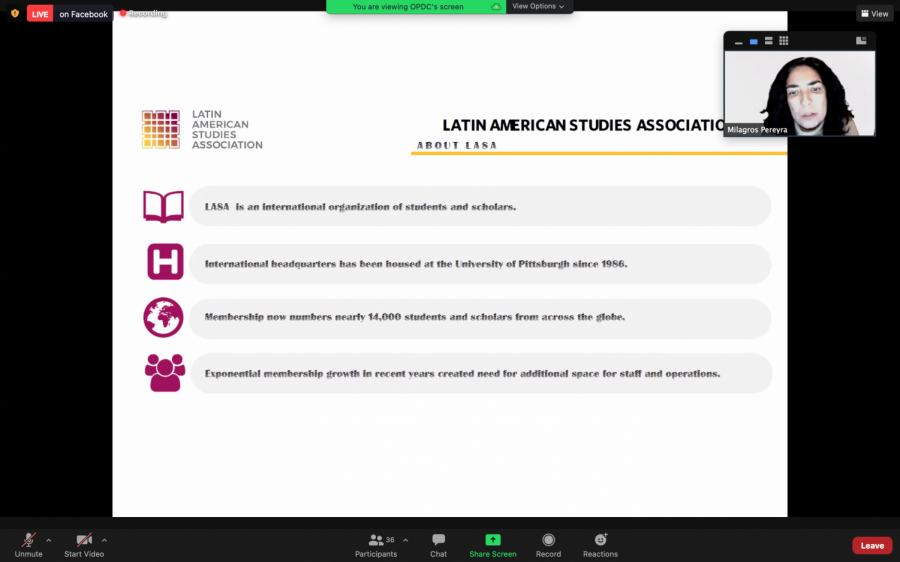Community members discuss proposed Latin American Cultural Center on Bigelow
Representatives for the Latin American Studies Association presented their plans to turn the building on 4338 Bigelow Blvd. into a new Latin American Cultural Center at Tuesday’s OPDC meeting.
January 27, 2021
Melissa Miller, an Oakland community member, is looking forward to seeing a now-vacant building on Bigelow Boulevard turned into a Latin American Cultural Center. Miller said the last time she was inside the building was when it housed the Historical Society of Western Pennsylvania
“This sounds like an exciting project and a great way to energize this beautiful building,” Miller said.
Representatives from the Latin American Studies Association presented their proposal to renovate the building on 4338 Bigelow Blvd. into a Latin American Cultural Center at the Oakland Development and Planning Corp’s public meeting held Tuesday evening via Zoom. The board also discussed increasing air pollution in Pittsburgh and conducting research into the topic.
Milagros Pereyra-Rojas, LASA’s executive director, said the historic building will act as a new center of operations for the organization. She said the center is set to open to the public this fall by appointment only, after being in development since 2019. LASA’s offices are currently located in Bellefield Hall.
“Our plans for the building are to establish a new international center for LASA operations and to implement a Latin American Cultural Center and Museum, taking advantage of and respecting the history of the building,” Pereyra-Rojas said. “We are also considering the possibility of renting some of the space to the public to partially sustain the Center.”
Pereyra-Rojas also said parking for the Cultural Center would be available at the Soldiers & Sailors Parking Garage, due to an existing relationship between the Center and Pitt.
Sandra Budd, LASA’s assistant director, said the group plans to house both permanent and temporary exhibits in the center. She said the temporary exhibits will address topics related to Latin America mostly with photography and art, while the permanent exhibits will go in depth on Latin American history, geography, arts and culture.
Budd, who is also the curator for the center, said LASA also plans to utilize an auditorium for performances, lectures, film screenings and school group programs. Ultimately, she said the goal is to better understand Latin American societies and share its rich history and culture.
“The Latin American Cultural Center Mission is to celebrate Latin American cultures through compelling physical and cyber spaces dedicated to sharing and fostering a heightened understanding and appreciation for Latin American arts, history and culture,” Budd said.
Other community members, like Kathy Gallagher, are excited about the prospect of the Latin American Cultural Center. Gallagher also said she’s ready for the parking lot right in front of the building to be taken away.
“Great to see you have a presence in the neighborhood and using this wonderful building,” Gallagher said. “I’ll be happy to see the front parking lot go.”
Then representatives from the Breathe Project, a local environmental group, took the floor to discuss the increasing air pollution in the Pittsburgh area. Allegheny County has received straight F’s from the American Lung Association for air quality for the last decade, and Pittsburgh also ranks in the dirtiest 11.5% of U.S. cities, according to the Breathe Project’s Breathe Meter.
Matthew Mehalik, the executive director of the Breathe Project, said he’s passionate not only about Pittsburgh’s air quality, but the City’s sustainability, too. Mehalik also teaches sustainability and environmental policy classes at Carnegie Mellon University.
“We still have a serious air quality problem, and we have challenges with not only legacy air pollution issues but new threats to our airshed,” Mehalik said.
Mehalik also said the air quality of the region greatly affects public health. He referenced a 2014 National Air Toxics Assessment from the Environmental Protection Agency that found Pittsburgh is in the top 10% of cancer risk places in the entire country. According to Mehalik, air pollution also greatly increases the likelihood of death due to COVID-19.
Mehalik said he believes it’s necessary to unite the community against air pollution to make real change.
“We exist because we have a persistent air quality problem that affects our entire region,” Mehalik said. “It requires moving together as a community — as a large coalition — in order to move the needle on air pollution. The reason that the Breathe Project exists is to act as that coordinating hub.”
Mehalik said he encourages those in attendance to do research into air pollution in the area. Through spreading awareness to those in the community, he said the Breathe Project can tackle Pittsburgh’s unclean air problem.
“We’re trying to come together, share this story with communities around Pittsburgh and invite people to join in the campaign work we’re doing,” Mehalik said.



